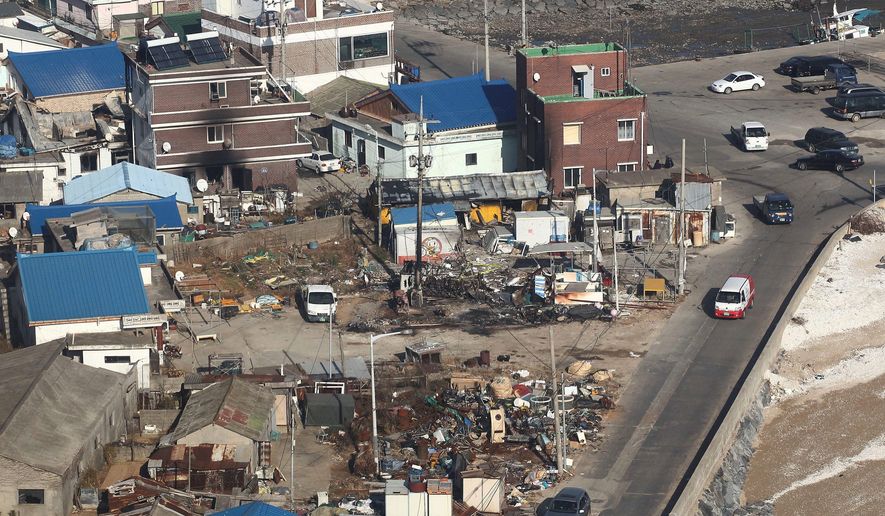The Obama administration called on China Wednesday to rein in North Korea after its artillery attack on a South Korean island, as the Pentagon ordered the USS George Washington aircraft carrier strike group to the Yellow Sea for naval exercises with South Korean forces.
Search crews on the island located off South Korea’s west coast also recovered the charred bodies of two civilians Wednesday.
China, which has a defense agreement with communist North Korea, is the key to changing Pyongyang’s behavior, said State Department spokesman P.J. Crowley.
“We do believe that China has influence with North Korea,” he said. “We don’t want to understate or overstate that. It’s not that China can dictate a particular action to North Korea. It is that China, together with the United States and other countries, have to send a clear, direct, unified message that it is North Korea that has to change.”
At the United Nations, Security Council, members held talks on the attack, but news reports indicated that action on the matter was unlikely. The Security Council took months to condemn North Korea’s sinking of a South Korean warship and then did not mention North Korea by name.
At Incheon, South Korea, residents of the bombed island told stories of the midafternoon artillery barrage.
“Over my head, a pine tree was broken and burning,” said Ann Ahe-ja, who was among the hundreds of evacuees from Yeonpyeong Island arriving at the port. “So I thought, ’Oh, this is not another exercise. It is a war.’ I decided to run. And I did.”
In addition to the two civilians, two South Korean marines were killed and 18 wounded in the artillery strike, which destroyed 30 homes.
The shelling followed South Korean military exercises involving artillery fire south of the island.
Wang Baodong, a Chinese Embassy spokesman in Washington, said all parties in the crisis must “help relax the tension.”
China opposed the deployment of the George Washington to the Yellow Sea earlier this year, claiming the carrier could threaten China.
In a phone conversation late Tuesday night, President Obama and South Korean President Lee Myung-bak agreed to hold joint military exercises. Mr. Obama also pledged to stand “shoulder to shoulder” with the South.
The attack on Yeonpyeong Island was the largest major military skirmish since the Korean War ended with an armistice agreement in 1953. The attack also resulted in the first civilian deaths in an assault since the bombing of a South Korean airliner in 1987.
The carrier strike group will arrive in the Yellow Sea west of the Korean Peninsula on Sunday for four days of joint exercises.
A military official said an additional aircraft carrier strike group could be moved to the region, but that no decision had been made.
“This exercise is defensive in nature,” U.S. Forces Korea said in a statement, noting that the exercises were planned before the attack on Yeonpyeong.
Still, the exercises are likely to anger China.
Chinese Maj. Gen. Zhu Chenghu told staterun media in July that “if the United States truly wants to take into account the overall interests of the Sino-U.S. relationship, then it must on no account send its USS Washington to the Yellow Sea.” He called the area “sensitive.”
The Pentagon rejected the Chinese criticism and said Navy ships, including carriers, will transit the Yellow Sea because it is in international waters.
John Park, a senior research associate at the U.S. Institute of Peace, said the deployment of the strike group is “almost a warning to China.”
“The power projection capabilities of the USS George Washington, with its fighter aircraft wing, extends all the way to Beijing,” Mr. Park said.
The attack on Yeonpyeong followed the sinking in March of the South Korean warship Cheonan by a North Korean torpedo in the same region. Forty-six South Korean sailors were killed in the Cheonan incident.
Tensions also are heightened over North Korea’s once-covert uranium enrichment program that was shown recently to three visiting American nuclear specialists.
In an interview with ABC News on Tuesday, Mr. Obama called on China to stand firm and “make clear to North Korea that there are a set of international rules that they need to abide by.”
Mr. Wang, the Chinese Embassy spokesman, told The Washington Times that China is paying close attention to developments in its neighborhood.
“China has been calling for peaceful settlement of conflict through dialogue and consultations and is opposed to any activity that harms the peace and stability of the peninsula,” Mr. Wang said.
Chinese officials have deplored the loss of life and damage to property on Yeonpyeong Island, while not directly condemning the cash-strapped North, which benefits mainly from Chinese economic aid.
The Chinese statement stood in stark comparison to the U.S. response, which was an outright condemnation of the North. U.S. officials, meanwhile, said they think the artillery attack was an isolated incident.
“This was, in our view, a one-off, premeditated act,” Mr. Crowley told reporters. “Without getting into intelligence matters, we don’t see that North Korea is … preparing for an extended military confrontation.”
The military official said there were few indicators that North Korean forces were preparing for a larger conflict.
• This article is based in part on wire service reports.




Please read our comment policy before commenting.